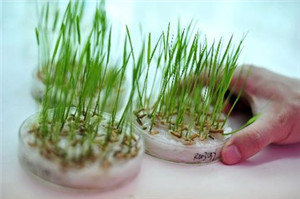(单词翻译:单击)

A war of words in China has reignited public debate over just how far genetically modified food -- still mostly illegal here -- has already infiltrated the country.
一场口水战再度激起了中国公众对转基因食品已在多大程度上渗透进中国的争论。目前在中国,大多数转基因食品仍是非法的。
The spat began as an investigation. In April, following on government reports that illegal GMO corn and cotton had been found on the southern Chinese island of Hainan, the nonprofit Greenpeace, which monitors GMO issues, dispatched two employees to learn more.
争论是从一次调查开始的。4月份,在政府发布报告称在海南岛发现非法转基因玉米和棉花之后,一直关注转基因问题的非营利组织绿色和平(Greenpeace)派出两位员工寻找更多答案。
The two visited the area referenced in the report, a GMO development site run by Huazhong Agricultural University, one of the nation's leading research institutes on crop genetics. The pair took three bags of rice seeds just outside the trial-planting area belonging to the university, which is working to develop GMO rice strains. They were planning to see if GMO seeds from the trial site had found their way to adjacent farmland.
这两位员工访问了报告中提到的区域──华中农业大学运作的一个转基因开发基地。华中农业大学是中国领先的作物基因研究机构之一。两人在这所大学用于研发转基因水稻品种的试验田外取走三包水稻种子。他们计划观察来自试验田的转基因种子能否进入相邻的农田。
Campus staff at the site, though, stopped them and demanded they return the seeds, saying the land outside the trial area also belonged to the university. The Greenpeace employees obliged, and were allowed to leave.
但在场的学校员工阻止了他们,并要求退还种子。学校员工说,试验田外的土地也归学校所有。绿色和平的员工答应了要求,并获得放行。
That might have been the end of the story. But Huazhong, still upset by the incident, then published an article on its website that accused Greenpeace of thieving GMO rice seeds. Greenpeace shot back, denying the accusations, while also noting that the university's test bed was located less than 20 meters from surrounding farmland--an apparent breach of state law, which requires a minimum buffer of 100 meters.
这原本可能是故事的结尾。但华中农业大学仍对上述事件感到不满,之后在其网站上发表了一篇文章,指责绿色和平盗窃转基因水稻种子。绿色和平则进行回击,否认华中农业大学的指控,并指出该校的试验田距离周围的农田不超过20米,明显违反国家法律。根据国家法律,转基因作物试验田最少需要有100米的隔离缓冲带。
University officials couldn't be immediately reached for comment.
记者无法立即联系到华中农业大学的管理人员置评。
The Ministry of Agriculture then weighed in. Without specifying Greenpeace by name, on Sunday, it said in a statement that said security around areas working to develop GMOs should be boosted. Greenpeace again responded, explaining why it had gone to the area, and suggested that 'problems with the management of GMO seeds planted on a trial basis at the university could have led to GMO seeds 'drifting' to areas outside the university.'
农业部对此做出了表态。该部门周日发布了一份通知,通知并没有点名绿色和平,但是表示应该加强转基因实验基地周边的安全。绿色和平就此作出回应,解释了为什么会进入该地区,并表示“在调查过程中绿色和平注意到华中农业大学南繁基地存在管理问题,可能导致基因漂移风险”。
This isn't the first time Greenpeace has warned that illegal GMO grains may be running amok in China. The country is in the early stages of introducing GMO food into the human diet. While it has not yet allowed public sales of GMO grains, including rice, corn and wheat, it allows related scientific research and limited imports -- as long as the imports are used only for animal consumption. Some forms of GMO food are also permitted for humans if they've been processed, such as GMO soybeans used to manufacture soy oil. Even under these constraints, Chinese universities and companies do develop their own GMO strains.
这并非绿色和平第一次就转基因谷物或在中国泛滥的问题做出警告。中国在生产人类可食用转基因食品方面正处于初级阶段。尽管中国尚未允许公开销售包括转基因大米、玉米以及小麦在内的转基因谷物,但是该国允许进行相关的科学研究以及规模有限的进口,但这些进口转基因谷物仅用于动物饲料。某些种类的转基因食品也允许被人类食用,但前提是这些转基因食品得到了加工,比如用于生产大豆油的转基因大豆。尽管在这些限制条件下,中国的大学和企业仍在开发自己的转基因品种。
But the prevalence of GMO food in China remains a hot potato. Public resistance to GMO continues to run deep, in part because GMOs are closely associated with fears of becoming reliant U.S. technology, which still dominates the GMO industry.
不过,转基因食品在中国的推广却是一个棘手问题。公众对于转基因食品仍然有较深的抵抗情绪,其中部分原因在于转基因产品与担心依赖美国技术挂上了钩。美国技术仍然在转基因领域占据主导力量。
One might say the feud in Hainan has reached a draw. No law enforcement official has gotten in touch with Greenpeace so far, and there hasn't been any sign of further investigations into the matter, Greenpeace spokesman Damin Tang said. Because the seeds were quickly returned, Greenpeace also had no conclusive evidence on whether GMO seeds had indeed 'drifted' off the Sanya campus.
有人可能会说海南的这起争端打了个平手。绿色和平的发言人唐大 说,到目前为止,没有执法人员接触绿色和平,也没有对此事进行进一步调查的任何迹象。由于已经归还了水稻种子,绿色和平也没有确凿的证据来说明转基因种子是否已漂移出转基因实验基地。
The debate has nonetheless spilled into China's microblogging platforms, with opinions swinging between criticism of Greenpeace and suspicion of China's government. 'You have invited a thousand people to try to eat genetically modified rice,' a blogger wrote, referring to ' taste tests' for the public conducted by officials and academics using GMO rice . 'What position are you in to talk about stealing materials and keeping secrets? What are you afraid of losing?'
不过,这场争论已蔓延至中国的微博平台,人们在微博上发表了从批评绿色和平到质疑政府的各种意见。在提到政府官员和学者组织公众“试吃”转基因大米时,一位网友写道:你们已经邀请了一千人试吃转基因大米,你们站在什么立场上说窃取转基因实验材料和保密?你们害怕丢什么?
Others said the police should investigate Greenpeace. 'Do you know it's an extremist environmental group?' another wrote.
还有一些人认为警方应该调查绿色和平。另一位网友写道:你知道这是一个极端的环保组织吗?
But there's already a sense of resignation that the spread of GMOs is well underway in China. 'Illegal GMO products have come into supermarkets, and the agricultural ministry still pretends to be unaware of it,' Cui Yongyuan, a former TV commentator, wrote on his verified Sina Weibo account.
不过,现在已让人不由得感到转基因作物正在中国推广。前中央电视台主持人崔永元在他实名认证的新浪微博上写道:非法转基因食品都进了超市,农业部还假装不知道呢。


